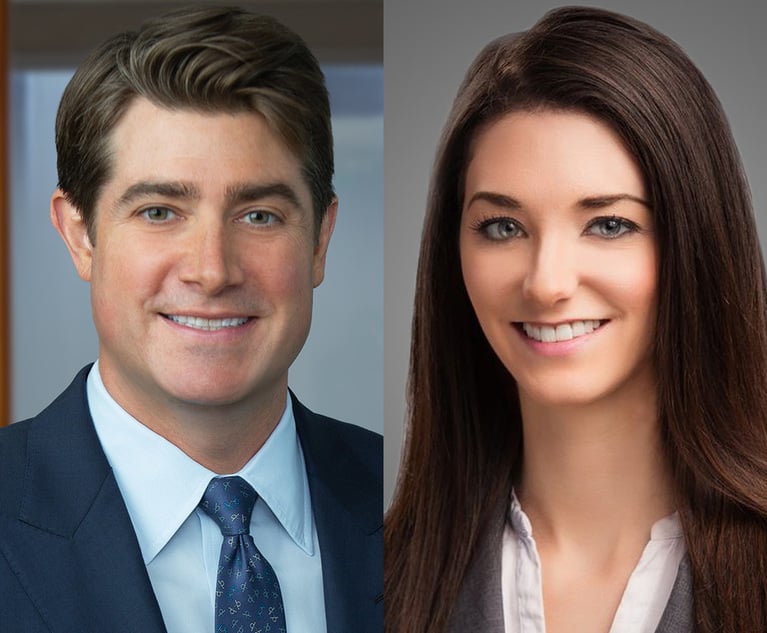Chicago Bar Task Force Recs Steer Clear of Outside Ownership in Law Firms
The first voluntary bar group to address regulatory reform aimed at increasing access to justice instead proposed a new "intermediary model" allowing lawyers to affiliate with larger networks for branding and ancillary services.
July 22, 2020 at 05:39 PM
5 minute read
 Chicago skyline.
Chicago skyline.
A Chicago Bar Association task force focused on reforms to the profession released on Wednesday recommendations that include allowing lawyers to partner with intermediary organizations to handle business tasks and connect to consumers, but the group stopped short of endorsing outside ownership of law firms.
The Task Force on the Sustainable Practice of Law and Innovation—a joint initiative of the CBA and the Chicago Bar Foundation, its access-to-justice-oriented charitable arm—is the first bar group in the United States with a voluntary membership to enter into the contentious discussion about regulatory reform, after courts and mandatory bar groups in California, Utah and Arizona have issued their own sets of recommendations.
"Our court is supportive, but they're not driving the process in they way they're doing in other states," said CBF executive director Bob Glaves. "This really came from the bar recognizing that we had to get out in front of this."
The groups launched the task force in October 2019, affording them the opportunity to take lessons from the states that have moved first. Those efforts have gone in differing directions after recommendations were made public: Utah is moving full-steam ahead with its "regulatory sandbox" aimed at allowing new legal businesses to test the waters, while California's state bar hit pause on a similar proposal in March before agreeing to revisit the issue two months later."
Task force co-chair Justice Mary Ann Mason, a retired Illinois appellate court jurist and board secretary of the CBF, said that the group consciously steered away from the regulatory sandbox model, believing that Illinois is simply too big of a market to explore new ideas in such a fashion.
"Instead, we focused on recommending updates to the rules for professional conduct that will bring the legal profession into the 21st century," she said. "Virtually, every aspect of our lives can be conducted remotely with the exception of access to justice. Until the pandemic, you had to come to a brick-and-mortar building during business hours, take time out from work. It was a long, drawn out process. We have a desire to align our profession with the rest of society and the way people do business."
The task force recommendation of a new "intermediary model" that would allow solo practitioners and small firms to affiliate with larger networks for branding and ancillary services like administration and technology fits along with that goal. Doctors, dentists, accountants and other professionals have already taken this step, according to the 112-page report.
Glaves drew a specific analogy to the dental profession, where hundreds of small practices have affiliated with Aspen Dental for these services.
"If you just want to be a dentist, and practice your craft, you can affiliate with this larger network at different levels," he said. "It takes some degree of fee-sharing to be able to do that. But this idea gives lawyers the ability to affiliate for the other types of expertise you need to succeed in today's world."
Other recommendations included the creation of an "approved legal technology provider" designation to be subject to regulation, and streamlined and modernized rules about lawyer advertising.
These recommendations and others are now open for public comment, and a final report will be delivered to the Illinois Supreme Court in the fall.
"We certainly have the support of our Illinois Supreme Court," said task force co-chair Lynn Grayson, a partner at environmental law firm Nijman Franzetti and the next president of the CBA. "[Chief Justice] Anne Burke has been helpful and providing guidance."
The task force declined to specifically advocate for a full repeal of restrictions on the outside ownership of law firms, instead recommending that the Supreme Court evaluate relaxing or eliminating Rule 5.4 of the American Bar Association's model rules at a later date. This question elicited sharp push back from California attorneys during that state's public comment period.
"What we were really focused on was an opportunity to make changes that could be adopted in Illinois and would have the greatest impact on the majority of Illinois practitioners as soon as possible," Grayson said. "With outside ownership, we're supportive of it, it's time has come. But it needs more evaluation and assessment."
But even if the majority of participants favored this more substantial change, according to Glaves, the report did come with a dissenting letter from task force member John Thies, a partner at central Illinois midsize firm Webber & Thies.
"We are strongly opposed to the recommendations that would permit greater influence by non-lawyers in the operation of law firms, or in the handling of particular client matters," he wrote. "As the recent experience of the American Bar Association's House of Delegates shows, there is no appetite within that body for such radical change, for good reason."
The task force included representatives from large and small law firms, legal academia and the public interest world. Big Law offered attorneys from Barnes & Thornburg, Taft Stettinius & Hollister, Holland & Knight and Hinshaw & Culbertson.
While the coronavirus pandemic forced an end to in-person meetings in the middle of the process, the participants were able to quickly pivot to remote gatherings, and members doubled down on their resolve to abide by the original timetable.
"What the pandemic and the nationwide social unrest over inequality really drove home from the task force was the need to act on these recommendations," Justice Mason said. "The status quo is unsustainable, and it's unacceptable."
This content has been archived. It is available through our partners, LexisNexis® and Bloomberg Law.
To view this content, please continue to their sites.
Not a Lexis Subscriber?
Subscribe Now
Not a Bloomberg Law Subscriber?
Subscribe Now
NOT FOR REPRINT
© 2025 ALM Global, LLC, All Rights Reserved. Request academic re-use from www.copyright.com. All other uses, submit a request to [email protected]. For more information visit Asset & Logo Licensing.
You Might Like
View All
White & Case Crosses $4M in PEP, $3B in Revenue in 'Breakthrough Year'
6 minute read
Haynes and Boone Expands in New York With 7-Lawyer Seward & Kissel Fund Finance, Securitization Team
3 minute read
'None of Us Like It': How Expedited Summer Associate Recruiting Affects Law Students and the Firms Hiring Them

Sheppard Mullin, Morgan Lewis and Baker Botts Add Partners in Houston
5 minute readLaw Firms Mentioned
Trending Stories
Who Got The Work
J. Brugh Lower of Gibbons has entered an appearance for industrial equipment supplier Devco Corporation in a pending trademark infringement lawsuit. The suit, accusing the defendant of selling knock-off Graco products, was filed Dec. 18 in New Jersey District Court by Rivkin Radler on behalf of Graco Inc. and Graco Minnesota. The case, assigned to U.S. District Judge Zahid N. Quraishi, is 3:24-cv-11294, Graco Inc. et al v. Devco Corporation.
Who Got The Work
Rebecca Maller-Stein and Kent A. Yalowitz of Arnold & Porter Kaye Scholer have entered their appearances for Hanaco Venture Capital and its executives, Lior Prosor and David Frankel, in a pending securities lawsuit. The action, filed on Dec. 24 in New York Southern District Court by Zell, Aron & Co. on behalf of Goldeneye Advisors, accuses the defendants of negligently and fraudulently managing the plaintiff's $1 million investment. The case, assigned to U.S. District Judge Vernon S. Broderick, is 1:24-cv-09918, Goldeneye Advisors, LLC v. Hanaco Venture Capital, Ltd. et al.
Who Got The Work
Attorneys from A&O Shearman has stepped in as defense counsel for Toronto-Dominion Bank and other defendants in a pending securities class action. The suit, filed Dec. 11 in New York Southern District Court by Bleichmar Fonti & Auld, accuses the defendants of concealing the bank's 'pervasive' deficiencies in regards to its compliance with the Bank Secrecy Act and the quality of its anti-money laundering controls. The case, assigned to U.S. District Judge Arun Subramanian, is 1:24-cv-09445, Gonzalez v. The Toronto-Dominion Bank et al.
Who Got The Work
Crown Castle International, a Pennsylvania company providing shared communications infrastructure, has turned to Luke D. Wolf of Gordon Rees Scully Mansukhani to fend off a pending breach-of-contract lawsuit. The court action, filed Nov. 25 in Michigan Eastern District Court by Hooper Hathaway PC on behalf of The Town Residences LLC, accuses Crown Castle of failing to transfer approximately $30,000 in utility payments from T-Mobile in breach of a roof-top lease and assignment agreement. The case, assigned to U.S. District Judge Susan K. Declercq, is 2:24-cv-13131, The Town Residences LLC v. T-Mobile US, Inc. et al.
Who Got The Work
Wilfred P. Coronato and Daniel M. Schwartz of McCarter & English have stepped in as defense counsel to Electrolux Home Products Inc. in a pending product liability lawsuit. The court action, filed Nov. 26 in New York Eastern District Court by Poulos Lopiccolo PC and Nagel Rice LLP on behalf of David Stern, alleges that the defendant's refrigerators’ drawers and shelving repeatedly break and fall apart within months after purchase. The case, assigned to U.S. District Judge Joan M. Azrack, is 2:24-cv-08204, Stern v. Electrolux Home Products, Inc.
Featured Firms
Law Offices of Gary Martin Hays & Associates, P.C.
(470) 294-1674
Law Offices of Mark E. Salomone
(857) 444-6468
Smith & Hassler
(713) 739-1250










